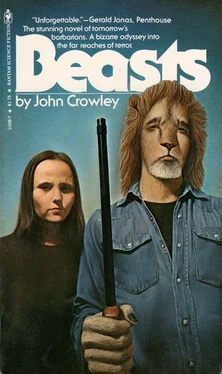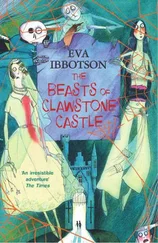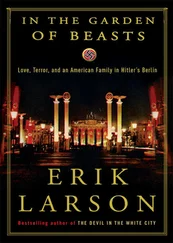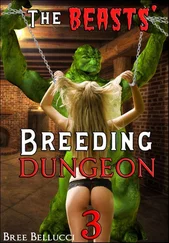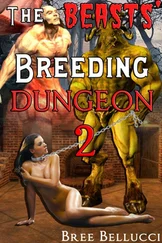“Come inside,” Painter’s thin voice said.
He took the recorder in a damp palm and pushed aside the tent flap. He went in.
Bree looked at the screen. The sun shone through the fabric of the tent, making the interior a burnt-ocher color; the walls were bright and the objects inside dark, bright-edged, as though the scene were inside a live coal. The leo was a huge obscurity, back-lit. The recorder was wide open, so values were blurred and exaggerated; dust motes burned and swam like tiny bright insects, the leo’s eyes were molten, soft, alive.
“You shouldn’t have eaten that meat, Meric,” Bree said. “You didn’t have to. You should have explained.”
Meric said nothing. The pressure of her ignorance on him, ignorance he could never dispel, was tightening around his heart.
“What do you want?” the leo said. For a long time there was no answer; the leo didn’t seem to await one. Then Meric, faint, off-mike said: “We think killing animals is wrong.”
The leo didn’t change expression, didn’t seem to take this as a challenge. Meric said: “We don’t allow it, anywhere within the Preserve.”
Bree waited for the leo to make arguments, to say, “But all living things eat other living things”; or, “We have as much right to hunt as the hawks and the dragonflies”; or, “What right do you have to tell us what to do?” She had counterarguments, explanations, for all these answers. She knew Meric did too. She wanted to see it explained to the leo.
Instead the leo said: “Then why did you come out alone?”
“What?” Meric’s voice, distant, confused.
“I said, why did you come out alone?”
“I don’t understand.”
“If you don’t allow something, something I do, there ought to be more than one of you to make me stop.”
As far as his emotions could be read, the leo wasn’t being belligerent; he said it as though he were pointing out a fact that Meric had overlooked. Meric mumbled something Bree couldn’t hear.
The leo said: “I have a living to get. It’s got nothing to do with these — notions. I take what I need. I take what I have to.”
“You have a right to that,” Meric said. “As much as you need to live, I guess, but…”
The leo seemed almost to smile. “Yes,” he said, “A right to what I need to live. That part’s mine. And another part too for my wives and children.”
“All right,” Meric said.
“And another part as, what, payment for what I’ve gone through, for what I am. Compensation. I didn’t ask to be made.”
“I don’t know,” Meric said. “But still not all; there’s still a part you have no right to.”
“That part,” the leo said, “you’re free to take away from me. If you can.”
Another long silence fell. Was Meric afraid? Bree thought, Why doesn’t he say something? “Why didn’t you explain ?” she whispered. “You should have explained.”
Meric pressed a lever on the editing table that froze the leo’s unwavering regard, and the golden dust motes in their paths around him too. All along his long way home he had wondered how he would explain: to Bree, to Emma, to them all. All his life he had been an explainer, an expresser, a describer; a transformer, an instrument through which events passed and became meaningful: became reasons, programs, notions. But there was no way for him to explain what had happened to him in the leos’ camp, because the event wouldn’t pass through him, it would never leave him, he was in its grasp.
“I had nothing to say,” he said to Bree.
“Nothing to say!”
“Because he’s right.” Right, right, how pointless. “Because if we want him not to do it, we have to make him. Because…” There was no way to say it, no way to pass it from him in words. He felt suffocated, as though he were caught in a vacuum.
When, after her affair with Grady, Bree had begun reading the Bible and talking and thinking about Jesus, she had tried to make Meric feel what she felt. “It’s being good,” she had said. Meric did his best to be good, to be Christlike, to be gentle; but he never felt it, as Bree did, to be a gift, a place to live, an intense happiness. He thought to say now that what he had felt in Painter’s tent was what she had felt when she first knew Jesus, when she had glowed continually with it and been unable to explain it, when it made her weep.
But what could that mean to Bree? Her gentle Jesus, her lover who asked nothing of her but to stand with her and walk with her and lie down with her, what had he to do with the cruel, ravishing, wordless thing that had seized Meric?
“It’s like Jesus,” he said, ashamed, the words like dust in his mouth. He heard her breath indrawn, shocked. But it was true. Jesus was two natures, God and man, the godhead in him burning through the flesh toward his worshipers, burning out the flesh in them. Painter was two natures too: through his thin, strained voice pressed all the dark, undifferentiated world, all the voiceless beasts; it was the world Candy had urged us to flee from and Jesus promised to free us from, the old world returned to capture us, speak in a voice to us, reclaim us for its own. It was as though the heavy, earth-odorous Titans had returned to strike down at last the cloudy scheming gods, as though the circle had closed that had seemed an upward spiral, as though a reverse messiah had come to crush all useless hope forever.
As though, as though, as though. Meric looked up from the face on the screen, and drew a deep, tremulous breath. Tears burned on his dirty cheeks. The chains, as they had in Painter’s tent, fell away from him. Nothing to say, yes, at last nothing to say.
Unable, despite a repugnance so deep it was like horror, to take her eyes from the screen, Bree heard unbidden in her mind the child’s song she still sometimes sang herself to sleep with: Little ones to him belong; they are weak but he is strong . She shuddered at the blasphemy of it, and stood as though waking from an oppressive dream. “It doesn’t matter,” she said. “Pretty soon they’ll be gone anyway.”
“What do you mean?”
“Grady told me,” she said. “There are Federal people here. One of those — animals committed a crime or something. The Feds want to go in and arrest him, or drive them off, or something.”
He stood. She turned away from his look, “Grady’s going with them. They were only waiting till you got back. What are you doing?”
He had begun to open cabinets, take out clothes, equipment. “I haven’t come back,” he said.
“What do you mean?”
He knotted together the laces of a pair of heavy boots so that they could be carried. “Do they have guns?” he asked. “How many are there? Tell me.”
“I don’t know. I guess, guns. Grady will be with them. It’s all right.” He seemed mad. She wanted to touch him, put a hand on him, restrain him; but she was afraid. “You have come back,” she said.
He pulled on a quilted coat. “No,” he said. “I came for this stuff.” He was cramming recording tape, lenses, bits and pieces quickly into his pack. “I meant to stay a night, two nights. Talk to Emma.” He stopped packing, but didn’t look up at her. “Say good-bye to you.”
A rush of fear contracted her chest. “Good-bye!”
“Now I’ve got to hurry,” he said. “I’ve got to reach them before Grady and those.” Still he hadn’t looked at her. “I’m sorry,” he said, quick, curt, rejecting.
“No,” she said. “What’s the matter?”
“I’m going back to them,” he said. “I’ve got to — get it all down. Record it all. So people can see.” He slung the pack over his shoulder, and filled his pockets with the bread she had set out for him. “And now I’ve got to warn them.”
Читать дальше
